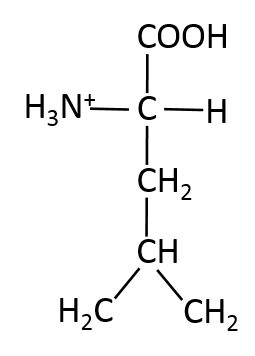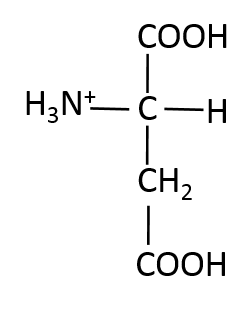All Biochemistry Resources
Example Questions
Example Question #91 : Identifying Biochemical Molecules
Which amino acid does this structure represent?

Asparagine
Arginine
Glutamine
Aspartate
Glutamate
Glutamate
The amino acid's R group is composed of an ethyl group, followed by a carboxylate group, and therefore represents glutamate.
Example Question #33 : Identification By Structure
Which amino acid does this structure represent?

Y
A
S
M
T
M
The amino acid's chiral carbon is connected to two methyl groups followed, by a sulfur, and finally another methyl group. Therefore, the amino acid is methionine (M).
Example Question #2 : Identifying Specific Protein Structures
The amino acid phenylalanine is pictured. If a hydroxyl group was added to the carbon in the red box, which amino acid would the new molecule most closely resemble?

Arginine
Alanine
Tyrosine
Lysine
Glysine
Tyrosine
The structure would most closely resembe tyrosine (pictured).

Example Question #301 : Biochemistry
If the phenyl group in the pictured molecule were removed, what amino acid would the new structure most closely resemble?

Tyrosine
Valine
Alanine
Phenylalanine
Glycine
Alanine
Alanine is the amino acid that would be formed by removing the phenyl group from phenylalanine (the pictured molecule).
Example Question #1 : Identifying Specific Protein Structures
If the amide group of glutamine (pictured here) was removed and a hydroxyl group was added to the carbon bound to the alpha carbon of the resulting structure, what amino acid would be formed?

Threonine
Valine
Tyrosine
Methionine
Cysteine
Threonine
Threonine (pictured here) would be formed.

Example Question #3 : Identifying Specific Protein Structures
Which of the following structures is methionine?






Methionine is a non-polar amino acid. It is one of two amino acids that contain sulfur, the other is cysteine.
Example Question #2 : Identifying Specific Protein Structures
Name the given structure.

Alanine
Valine
Leucine
Isoleucine
Lysine
Leucine
Leucine is a non-polar amino acid with a 
Example Question #4 : Identifying Specific Protein Structures
Which of the following is a polar amino acid?






The polarity of an amino acid is determined by the R-group. The electronegativity difference between oxygen and carbon creates a dipole with the partial positive being on carbon and the partial negative being on oxygen. The dipole makes the molecule polar.
Example Question #9 : Identifying Specific Protein Structures
Which of the following is a basic amino acid?






Bases, according to the Bronsted-Lowry definition, are substances that accept

Example Question #311 : Biochemistry
Identify the given amino acid.

Glutamine
Asparagine
Glutamic acid
Aspartic acid
Glycine
Glutamine
Glutamine is one of two amino acids that are amides. The nitrogen bonded to a carbon-oxygen double bond makes it an amide.
Certified Tutor
All Biochemistry Resources





